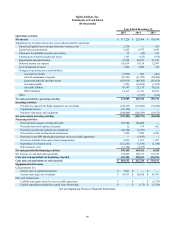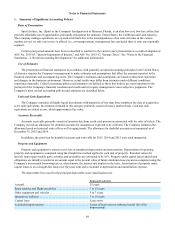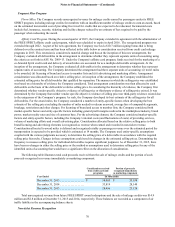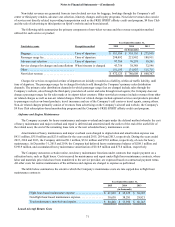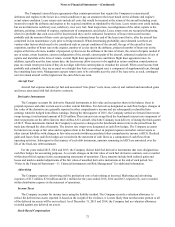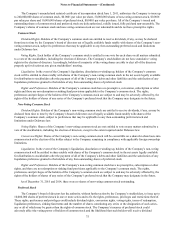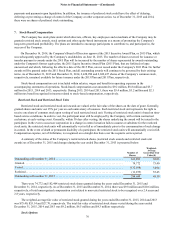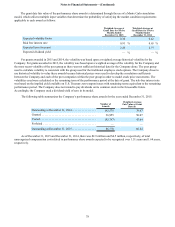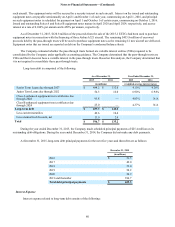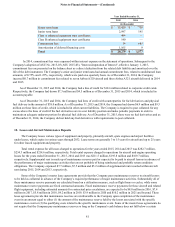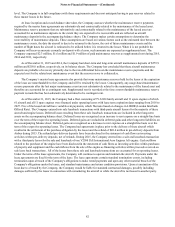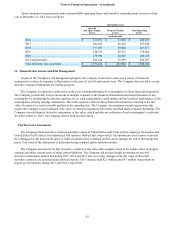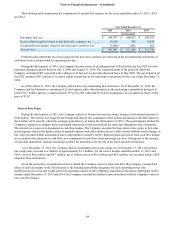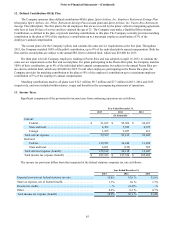Spirit Airlines 2015 Annual Report Download - page 75
Download and view the complete annual report
Please find page 75 of the 2015 Spirit Airlines annual report below. You can navigate through the pages in the report by either clicking on the pages listed below, or by using the keyword search tool below to find specific information within the annual report.Notes to Financial Statements—(Continued)
75
The Company’s amended and restated certificate of incorporation dated June 1, 2011, authorizes the Company to issue up
to 240,000,000 shares of common stock, $0.0001 par value per share, 50,000,000 shares of non-voting common stock, $0.0001
par value per share and 10,000,000 shares of preferred stock, $0.0001 par value per share. All of the Company’s issued and
outstanding shares of common stock and preferred stock are duly authorized, validly issued, fully paid and non-assessable. The
Company’s shares of common stock and non-voting common stock are not redeemable and do not have preemptive rights.
Common Stock
Dividend Rights. Holders of the Company’s common stock are entitled to receive dividends, if any, as may be declared
from time to time by the Company’s board of directors out of legally available funds ratably with shares of the Company’s non-
voting common stock, subject to preferences that may be applicable to any then outstanding preferred stock and limitations
under Delaware law.
Voting Rights. Each holder of the Company’s common stock is entitled to one vote for each share on all matters submitted
to a vote of the stockholders, including the election of directors. The Company’s stockholders do not have cumulative voting
rights in the election of directors. Accordingly, holders of a majority of the voting shares are able to elect all of the directors
properly up for election at any given stockholders’ meeting.
Liquidation. In the event of the Company’s liquidation, dissolution or winding up, holders of the Company's common
stock will be entitled to share ratably with shares of the Company’s non-voting common stock in the net assets legally available
for distribution to stockholders after the payment of all of the Company’s debts and other liabilities and the satisfaction of any
liquidation preference granted to the holders of any then outstanding shares of preferred stock.
Rights and Preferences. Holders of the Company’s common stock have no preemptive, conversion, subscription or other
rights and there are no redemption or sinking fund provisions applicable to the Company’s common stock. The rights,
preferences and privileges of the holders of the Company’s common stock are subject to and may be adversely affected by, the
rights of the holders of shares of any series of the Company’s preferred stock that the Company may designate in the future.
Non-Voting Common Stock
Dividend Rights. Holders of the Company’s non-voting common stock are entitled to receive dividends, if any, as may be
declared from time to time by the Company’s board of directors out of legally available funds ratably with shares of the
Company’s common stock, subject to preferences that may be applicable to any then outstanding preferred stock and
limitations under Delaware law.
Voting Rights. Shares of the Company’s non-voting common stock are not entitled to vote on any matters submitted to a
vote of the stockholders, including the election of directors, except to the extent required under Delaware law.
Conversion Rights. Shares of the Company’s non-voting common stock will be convertible on a share-for-share basis into
common stock at the election of the holder subject to the Company remaining in compliance with applicable foreign ownership
limitations.
Liquidation. In the event of the Company’s liquidation, dissolution or winding up, holders of the Company’s non-voting
common stock will be entitled to share ratably with shares of the Company’s common stock in the net assets legally available
for distribution to stockholders after the payment of all of the Company’s debts and other liabilities and the satisfaction of any
liquidation preference granted to the holders of any then outstanding shares of preferred stock.
Rights and Preferences. Holders of the Company’s non-voting common stock have no preemptive, subscription or other
rights, and there are no redemption or sinking fund provisions applicable to the Company’s common stock. The rights,
preferences and privileges of the holders of the Company’s common stock are subject to and may be adversely affected by, the
rights of the holders of shares of any series of the Company’s preferred stock that the Company may designate in the future.
As of December 31, 2015 and 2014, there were no shares of non-voting common stock outstanding.
Preferred Stock
The Company’s board of directors has the authority, without further action by the Company’s stockholders, to issue up to
10,000,000 shares of preferred stock in one or more series and to fix the rights, preferences, privileges and restrictions thereof.
These rights, preferences and privileges could include dividend rights, conversion rights, voting rights, terms of redemption,
liquidation preferences, sinking fund terms and the number of shares constituting any series or the designation of such series,
any or all of which may be greater than the rights of common stock. The Company’s issuance of preferred stock could
adversely affect the voting power of holders of common stock and the likelihood that such holders will receive dividend



